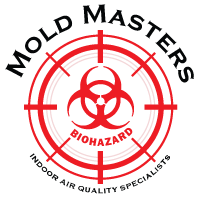#1 Will bleach kill mold?
Yes, bleach can kill mold; however, it will only work as long as the surface is non-porous. Examples of non-porous materials are bath tile, glass or plastic.
A better solution, though, to cleaning these non-porous surfaces is to use detergent and water. Just remember, never mix bleach with any other household cleaner, especially ammonia, as this combination can cause very serious injury and even death.
For porous services, we recommend calling a mold removal specialist.
#2 What is that moldy smell?
If your home smells moldy, it is important to not only locate the mold but also to determine what is causing the growth. Once the mold is cleaned and disinfected, and the cause of the moisture is corrected, the smell should be eliminated.
#3 When should I test?
If you or someone who lives in the home is having health problems that could be associated with mold we recommend testing your home immediately. Do not let these problems persist, as mold can cause serious health problems if not taken care of.
The Center for Disease Control (CDC) puts it another way.
“It is not necessary to identify the species of mold growing in a residence and the CDC does not recommend routine sampling for mold. No matter what type of mold is present, you should arrange for its removal.”
Whether you test it or not, the bottom line is the mold needs to be removed from the home as soon as possible.
#4 What are the effects of mold exposure?
Exposure to molds growing indoors is most often associated with symptoms such as nasal and sinus congestion, cough, chest tightness, dyspnea, exacerbation of asthma, upper respiratory tract infections, headaches and skin irritation.
Though long term exposure is unhealthy for anyone, it can be especially dangerous for infants and children, the elderly, people with respiratory conditions and individuals who are immunocompromised. (Reference: The Environmental and Occupational Health)
#5 How do I prevent mold?
Improper ventilation is one of the top causes for mold in homes. Areas that tend to have high moisture on a regular basis, such as bathrooms, need to have fans that are vented to the exterior. Areas that tend to have stagnant air, such as attics and bathrooms, should also have some sort of fan that will keep that air moving.
Moisture problems happen, whether from a spring flood in your basement, a leaky sink or condensation from pipes over the summer months. The important thing is to make sure that any moisture you have gets taken care of immediately so that mold has no place to grow. Dehumidifiers can be a big help in these situations.
The bottom line is this: Do your best not to let mold happen, but if you find mold don’t panic! Call a mold removal specialist and make sure to have it remediated as

